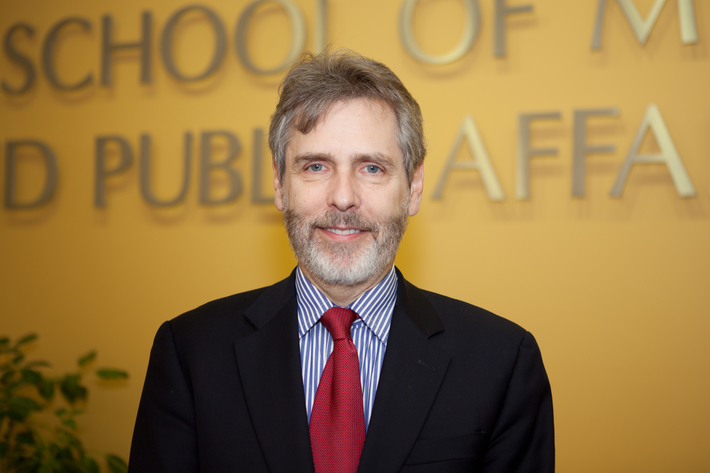By Adam Middleton
Twenty-five years ago, J.B. and M.C. Shapiro Professor of Media and Public Affairs Robert Entman stumbled upon a troubling pattern in local news coverage.
“I was doing some research on media coverage of primary elections and I noticed a huge number of stories on local news seemed to feature young black males in handcuffs or being escorted by police,” Entman said. “I saw this over and over in all thirty-something different cities. I thought, ‘What’s going on here?’”
This research on the skewed portrayal of black individuals grew into a full-time study of, as the title of his subsequent book coined it, The Black Image in the White Mind. The project was the latest of many ways the communications scholar got to explore his “long-standing interest in black-white relations.”
Moving from suburban New York to the West Side of Chicago and a predominantly black school when in the third grade, Entman remembers race and socioeconomic disparities making a big impression at an early age. Years later, as he pursued an undergraduate degree in political science at Duke University, student activism related to race reached its peak in the midst of the civil rights movement and refocused Entman’s attention on the things he noticed as a young boy. While in school, he also began to see the positive and negative influences media can have.
“I was involved in my college newspaper,” Entman said. “I saw how powerful we were even though we were a bunch of undergraduates who probably didn’t know exactly what we were doing. We still had a lot of power on that campus. We could draw attention to certain issues, people and incidents, shape agendas and discussions.”
Today, as professor of the Race, Media and Politics course, Entman continues to shed light on the media’s role in race relations and the responsibility of his students to exercise the media influence he recognized during his college experience.
“The goal is to look intensively at every major aspect of our political culture, which includes news, movies, commercials, video games, fashion magazines and more, and notice the patterns of difference in the images of blacks as opposed to whites,” he said, describing the class. “The course tries to imbue that critical eye and critical mindset and then tie it to theories about how people react to political symbols and stimuli--much of which is unconscious.
“The course is trying to tease out the idea that media both reinforces and helps to change our political culture. What’s in the media reflects our political culture and it reinforces with change as time goes on, but there’s also a lot of continuity.”
Entman discussed one aspect of this continuity in media coverage recently during a presentation entitled “Media Images of Black Males: Continuity > Change” and at the Office of Diversity & Inclusion’s Establishing Justice in an Imperfect Union event in January as part of the university’s annual celebration of the life and legacy of Dr. Martin Luther King, Jr. With the news attention that the killings of Michael Brown and Eric Garner received, Entman saw some improvement but overall many similarities with his studies from 25 years ago.
“We need to be cautious about assuming too much progress. I think there are some reminders of that in the Eric Garner and Michael Brown situations these past few months,” Entman said. “I do think some of the coverage was useful in reminding people that, yes, there’s a black president but it doesn’t really change how police behave on the ground in situations when they’re subjected to pressure and subconscious racial bias.”
Entman mentions the president because he’s seen the Obama election used frequently as the primary argument for a post-racial society. He says, despite the advancement it signals, the experiences of black people in this country continue to be affected by racism.
“We really need to remain mindful that there’s massive conscious and unconscious discrimination against black people in America still, and the election of a president here and a senator there and a governor here … you can take these little things and build them into a sense of a post-racial society that is just not good.”
Outside of his studies in race, Professor Entman has published a number of articles and books, including Democracy Without Citizens: Media and the Decay of American Politics, Communication in the Future of Democracy, Projections of Power: Framing News, Public Opinion and US Foreign Policy and, his most recent, Scandal and Silence: Media Responses to Presidential Misconduct.
In recent years, Entman has been working on studies in media bias, particularly as it relates to inequality.
“I began this before it became quite as popular a topic as it is seems to be now, because America’s an outlier in inequality and the most unequal of the wealthy countries,” he said. “As a political scientist my interest is ‘Why? Why do we let this happen?’ I’m taking the angle of looking at the media’s role and the political parties’ role in allowing the inequality to have grown as much it has.”
Entman is conducting his research through detailed computer-driven analyses of what politicians say in relation to inequality and other issues, using them as core areas of study in media bias. He says it may eventuate into his next major publication.
“There hasn’t been a good book about media bias, even though it’s the most popular subject among ordinary people in the street when we talk about media and politics,” he said. “So, that’s my end game.”


